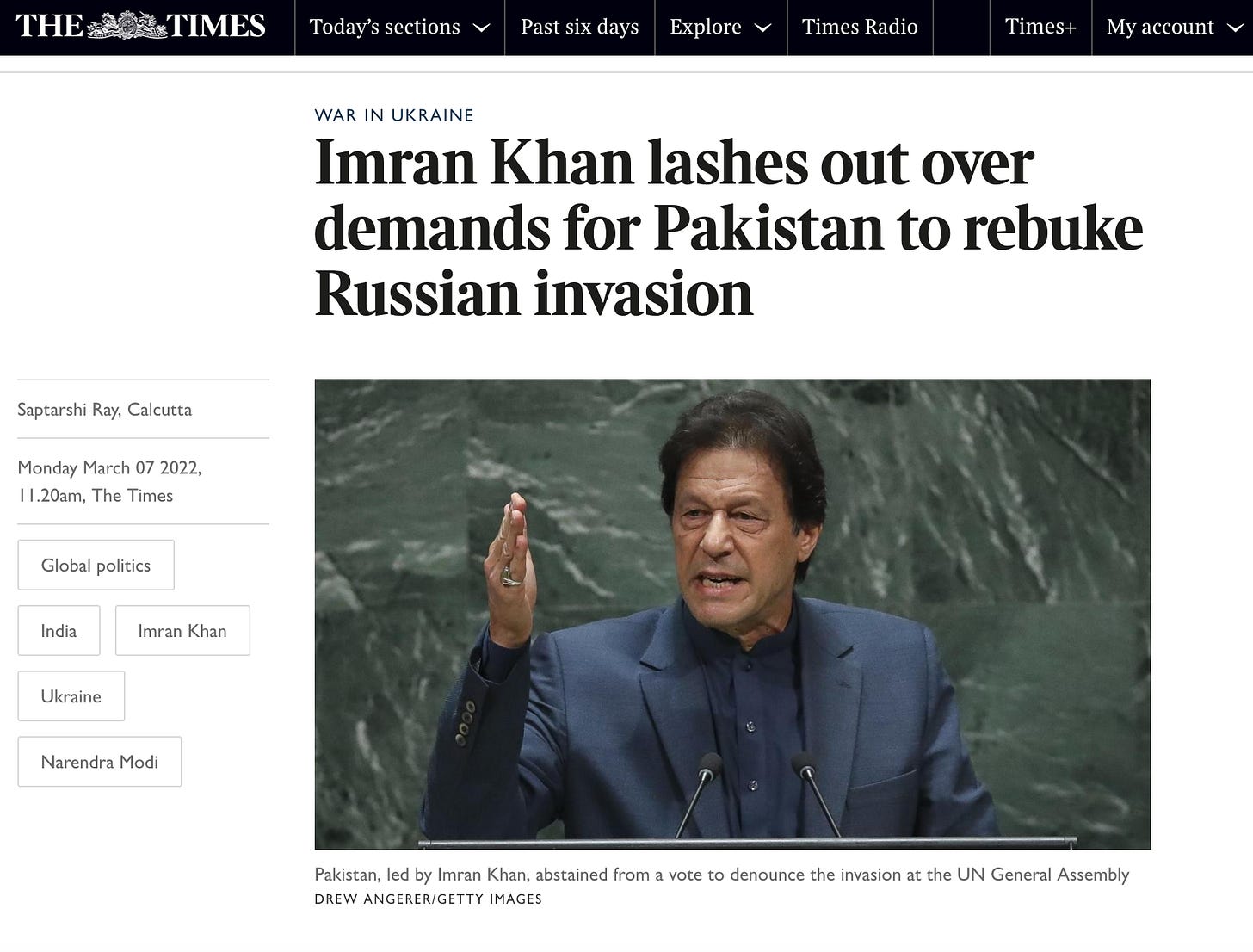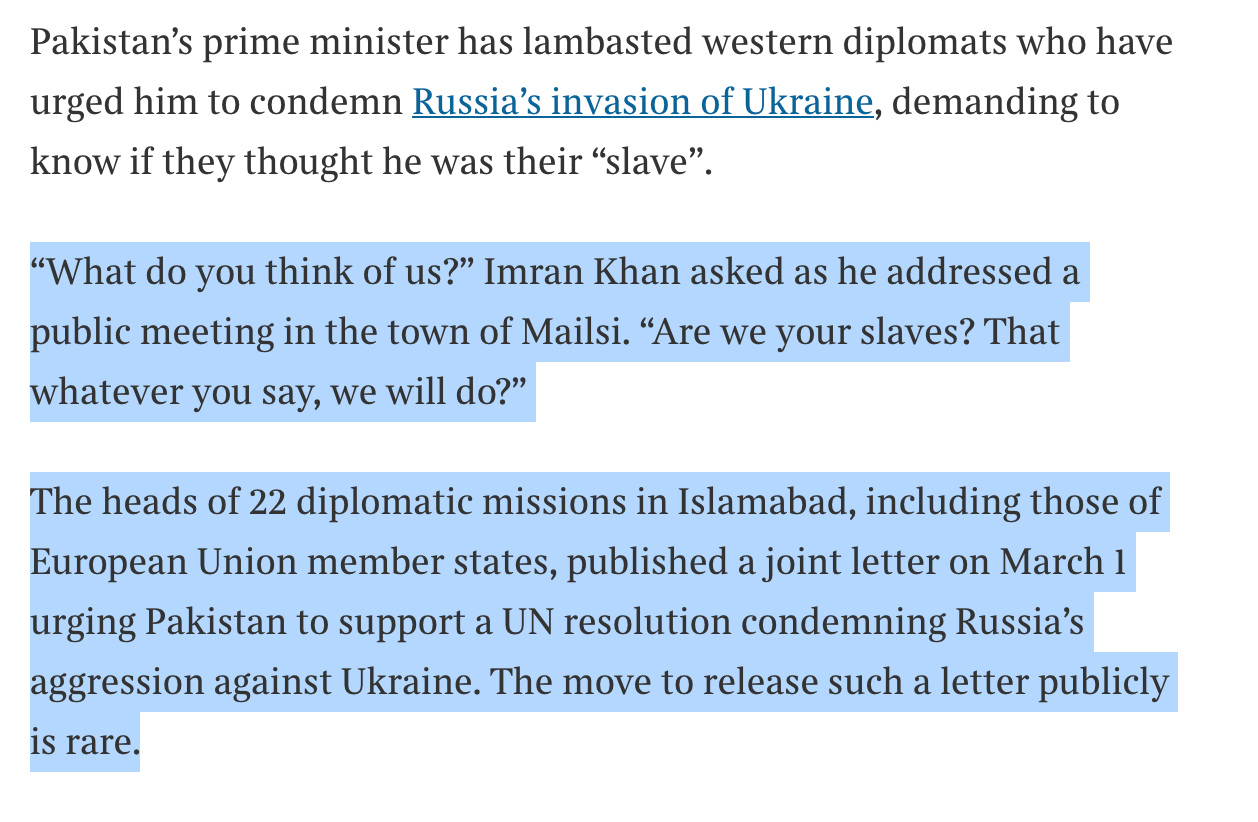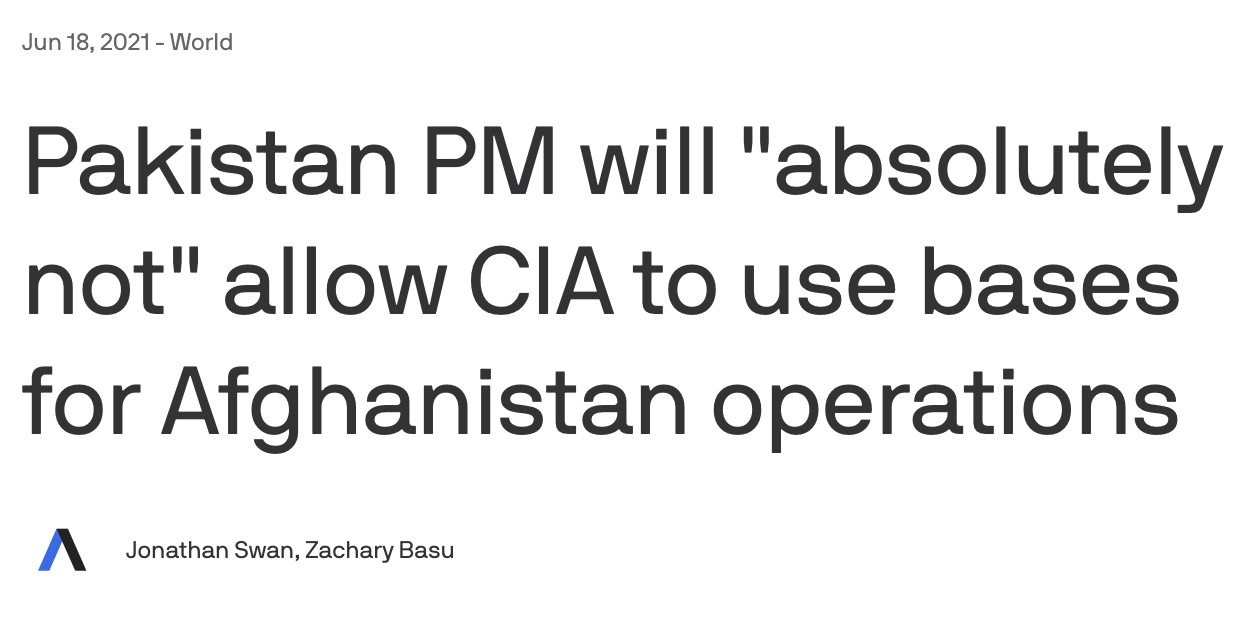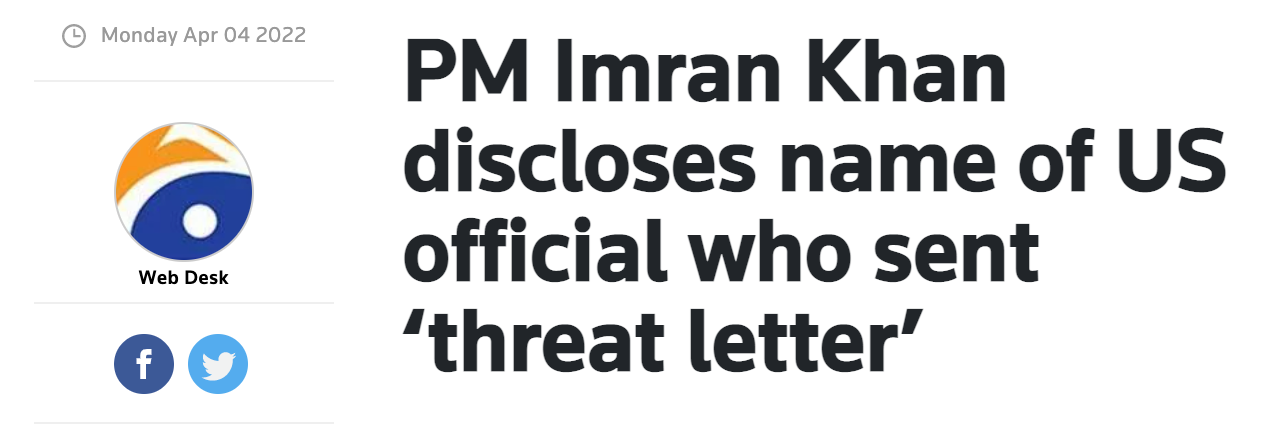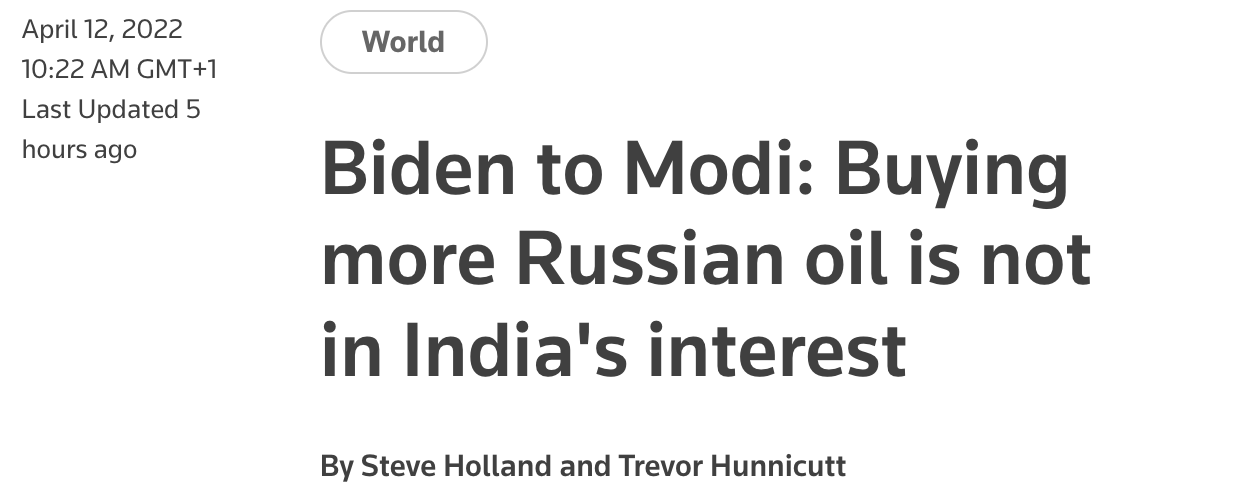PM Imran Khan Alleges "Regime Change" Attempt by Biden-Admin in Pakistan
It's Just Not Cricket
1) Pakistani Realignment
Since Pakistan gained independence in 1947, not a single Pakistani prime minister has completed a full five-year term in office. Despite defying odds to beat the two party system, PM Imran Khan has proven no exception. Last week, he was deposed in a motion of no confidence. Imran Khan has publicly and rather alarmingly blamed a Biden-admin “regime change” operation to punish him for visiting Putin and for his refusal to acquiesce to the US State Department’s demands over the Ukraine war. Calling foul play, the former cricket captain and world cup hero has vowed to fight on against what he calls “foreign conspirators”. Here are some match highlights to date.
i) Imran Khan and Putin
Early March, as Putin’s tanks rolled into Ukraine, Pakistani PM Imran Khan was in Moscow for talks. Since the USSR’s invasion of Afghanistan in the 80s, the two countries had been on opposite ends of the Cold War. But the failure of the US-led War on Terror and the US defeat in Afghanistan has steadily thawed diplomatic ties between the two countries.
Al-Jazeera reports:
ii) Pakistan at the UN
Such that when time came for Pakistan to vote on a motion critical of Russia at the UN, Pakistan under Imran Khan abstained. Pakistan’s former allies among Western nations were disturbed at this development. They expressed a highly unusual level of criticism at Pakistan’s sovereign foreign policy decisions in this regard. In a rare display of public pressure, the heads of 22 diplomatic missions in Islamabad issued an open letter urging Pakistan to condemn Russia at the UN. Imran Khan lashed out, demanding to know why Pakistanis are expected to act as Western “slaves”.
The Times reports:
iii) Pakistan and Bill Gates:
After both Khan’s visit to Moscow, and his rebuke at pressure to vote a certain way at the UN, Bill Gates decided to visit Pakistan for the first time. One is left to wonder why Gates chose this particularly strained time to visit, when he had never visited before. There he was met by none other than the President of the country.
“Microsoft co-founder Bill Gates on Tuesday wrote a letter to President Dr Arif Alvi wherein he thanked him for the warm welcome during his first visit to Pakistan in February, saying his foundation is keen to deepen the existing ties on issues of shared interests.”

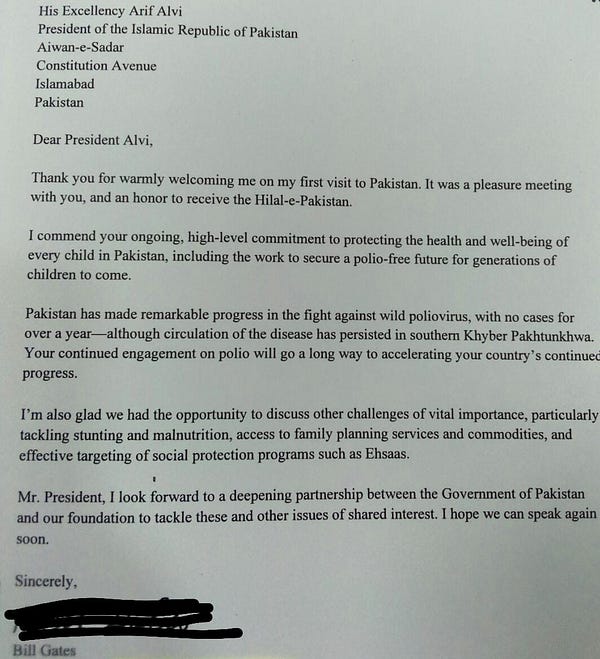
To be fair, and considering what happened before and after this visit, and particularly due to his now known role in the global Great Reset agenda, Bill Gates’ first visit to Pakistan is rather questioningly timed.
iv) CIA bases rejected in Pakistan
The above diplomatic difficulties come in the context of Pakistan under Khan already having refused point blank to allow the CIA to set up bases in order to launch attacks from that country into Afghanistan.
In 2021 a reporter for Axios asked Imran Khan:
“Will you allow the American government to have CIA here in Pakistan to conduct cross-border, counter-terrorism missions against al-Qaeda, ISIS or the Taliban?”
PM Imran Khan replies: “Absolutely not”
Reporter: “Seriously?”
Imran Khan: “There’s no way we’re going to allow any bases, any sort of action from Pakistani territory into Afghanistan, absolutely not.”


Was it something he said?…
v) Punishing Pakistan
The culmination of the above perceived insults by Pakistan to the United States of America has led to what Russian Foreign Ministry spokeswoman Maria Zakhrova has deemed as a decision to “punish” Pakistan.
“The further development of the situation leaves no doubt that the United States decided to punish the ‘disobedient’ Imran Khan,” Russian Foreign Ministry spokeswoman Maria Zakharova said on April 4, citing the PTI members’ “sudden” decision to join the opposition.
"This is another attempt at shameless interference by the U.S. in the internal affairs of an independent state for its own selfish purposes. The above facts eloquently testify to this. The Prime Minister of the Islamic Republic of Pakistan himself has repeatedly stated that the conspiracy against him is inspired and financed from abroad.”
2) The End of Pakistan’s Two-Party Oligopoly
i) State Corruption
In developments that initially led to his ability to break the two-party system, the two main political dynasties in Pakistan, Nawaz Sharif’s Pakistan Muslim League (PML) and the Bhutto family’s Pakistan People’s Party (PPP) were still reeling from what the Panama Papers had revealed in 2016 about off-shore political corruption.
Cases investigating this corruption were pending, former PM Nawaz Sharif had to resign in disgrace and Imran Khan became Prime Minster off the back of this scandal. Former PM Nawaz Sharif was eventually imprisoned and barred from holding public office.
Pakistan’s Dawn Newspaper reports:
These were followed in 2021 by further damaging leaks in the Pandora papers, which also implicated the Pakistani army leadership and some individual politicians serving under Khan.
Khan’s reputation as an outsider campaigning to clean up the country via his Tehriki Insaf Party (PTI) remained in place, and was in fact enhanced among many due to these startling revelations.
ii) Revenge of the Oligarchs
In an unprecedented move and fearing further justice that their loss of power and reputation would inevitably bring, Pakistan’s opposition parties formed a national umbrella movement to oust PM Khan and end his humiliating anti-corruption drive, while seeking to return Pakistan to their former protectors under the US State Department.
The opportunity to act came after Khan’s aforementioned visit to Russia and the war in Ukraine. A motion of no confidence against Khan was submitted to Parliament. But Khan dissolved his government before the motion could be voted on, instead calling a national election. In the context of such large corruption scandals, any national election could see Khan returned to office with a comfortable majority.
The opposition could not countenance this and took Khan to the Supreme Court to have him reinstated as PM, so that they could depose him themselves and replace him with one of their own for the remaining duration of Parliament. This worked. Khan was deposed and the brother of the disgraced former PM Nawaz Sharif, the former governor of Punjab Shehbaz Sharif was installed as Prime Minister.
The same people that for years looted the country were now back in power.
Pakistan’s Dawn Newspaper reports:
This is how a US-friendly but corrupt political dynasty was returned to power, and corruption allegations - including those that implicated the country’s new PM - could be parked.
3) Imran Khan & US-led “Regime Change”
i) Imran Khan Names Those Implicated
Imran Khan immediately took to the airwaves and made some incredibly serious allegations in front of the nation. He claimed that the American Under Secretary of State for South and Central Asian Affairs Donald Lu had summoned the Pakistani ambassador to DC and issued a threat, after Khan’s visit to Moscow.

Twitter user Tengku JPK12 has kindly provided a written translation (I confirm the meaning)
Imran Khan went so far as to even name the US official who threatened regime change:


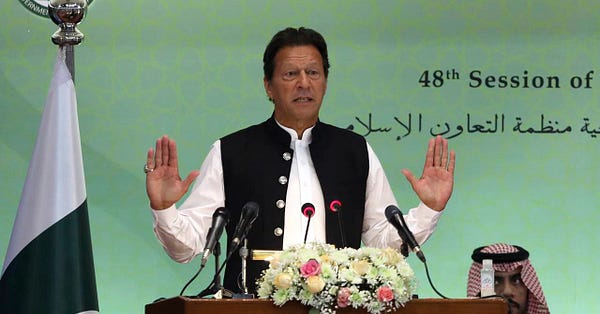
Pakistan’s Geo News reports:
Khan’s PTI party officials have even claimed that they sent the top secret diplomatic cable to the Pakistani Supreme Court.


Translation: “The secret sealed letter sent by the National Assembly on my instructions, which clearly states that if the no-confidence motion is successful then there will be a pardon - else Pakistan will face serious consequences, has been received by the Chief Justice's Office of the Supreme Court amid hopes of an inquiry by the court” (Deputy Speaker National Assembly of Pakistan. Provincial President PTI Balochistan. Member Central Advisory Committee, PTI official)
ii) National Protests
Despite the apparent existence of this diplomatic cable, the Supreme Court reinstated Khan as PM rather than allow a national election. This allowed the opposition to succeed in their motion of no-confidence, replacing Khan as PM with former PM Nawaz Sharif’s brother, Shehbaz.
This move sparked huge protests among everyday Pakistani PTI supporters.


None of these protests appear to have been televised anywhere.

iii) A Pakistani Army Perspective
The Pakistani army has traditionally intervened via military coups in times such as these. This time however the army abstained. Even appearing to criticise Khan, while bemoaning the traditional oligarchs. In fact, current army chief General Bajwa went further and openly criticised his own PM Imran Khan’s stance on the Ukraine war.
The Pakistani army’s senior command have traditionally been close to the US, and their top brass are political appointees. The current chief is outgoing, and Khan was jostling to have his own choice replace him.

Pakistani pro-army commentator and analyst Zaid Hamid reports:

Translation: “Imran wanted General Faiz to be the next army chief. But at the same time he stubbornly insisted that General Faiz should remain as ISI chief. This was impossible ... unless a general has a corps command he cannot become army chief. And on this point he had a sharp disagreement with General Bajwa and the army.”
iv) A US Perspective:
The US has of course denied any involvement in the alleged “regime change.”

These denials are issued despite President Biden already having declared a New World Order.
4) From America With Love
Such robust denials are not aided by the fact that all three South Asian countries that took a neutral position towards Russia at the UN appear to have been on the receiving end of fierce US State Department pressure.
The Times of London reports:
Here are various countries’ voting records on that last Russia-vote at the UN:
i) India
Soon after they too abstained from this UN vote, India faced intense pressure from US president Biden.
Reuters reports:
Reuters reports:
“Biden stopped short of making a "concrete ask" of Modi on Monday, an official said, noting India has concerns about deepening ties between Russia and China.
But he told Modi India's position in the world would not be enhanced by relying on Russian energy sources, U.S. officials said.
‘The president conveyed very clearly that it is not in their interest to increase that,’ said White House spokesperson Jen Psaki.
India's External Affairs Minister Subrahmanyam Jaishankar, at a news conference later on Monday, pushed back against a question on India's energy purchases from Russia, saying the focus should be on Europe, not India. "Probably our total purchases for the month would be less than what Europe does in an afternoon."
The Times of India brings more:
Bloomberg reports, as covered by the Times of India:
“The US has told India that the consequences of a ‘more explicit strategic alignment’ with Moscow would be ‘significant and long-term,’ he said.”
ii) Sri Lanka
Sri Lanka also abstained from the vote. That country too has faced the collapse of its government.
“Sri Lanka has strong diplomatic and trading ties with Russia, with the island nation exporting goods, such as tea, worth about $ 150 million annually. Russia has also consistently supported Sri Lanka at the UN Human Rights Council, in resolutions on war-time accountability and post-war reconciliation.”
Translation: “Sri Lanka: 41 government members join opposition, President loses majority”


The BBC reports: “On Monday, the bank's governor, Mr Cabraal announced that he had submitted his resignation after all of the country's cabinet ministers resigned.
Angry protesters have also been calling for the country's prime minister and president to step down.
The island nation of some 22 million people is suffering from its most serious economic crisis since independence from the UK in 1948.”
The above has led to the analysis that both Sri Lanka and Pakistan were punished for defying the US State Department:



5) The Future
Imran Khan has vowed to fight on, pulling all his PTI members out of Parliament and turning his “regime change” allegations into a campaign issue for the next elections.



One suspects that, like Trump in America, the deposed Khan will maintain very high levels of support among his own people while seeking to build his party from the ground up with those who are loyal to its anti-corruption aims. Khan’s ability to mobilise the public will remain, and mass demonstrations will serve as a prelude to the next election campaign wherein he will hope to sweep Parliament.
The order of events, with Khan’s refusal to allow CIA bases in Pakistan, his visit to Moscow on the eve of Ukraine’s invasion, his country’s abstention in the vote against Russia at the UN, Bill Gates’ strangely timed first visit to Pakistan after all of this unfolded, and the existence of this diplomatic cable purporting to show senior US State Department official Donald Lu threatening the country for defying America, will no doubt galvanise huge public anger towards the United States of America.
It remains to be seen whether the cricketer can succeed in riding this public rage through a wave of protests, but something tells me that these are certainly not his last innings.








